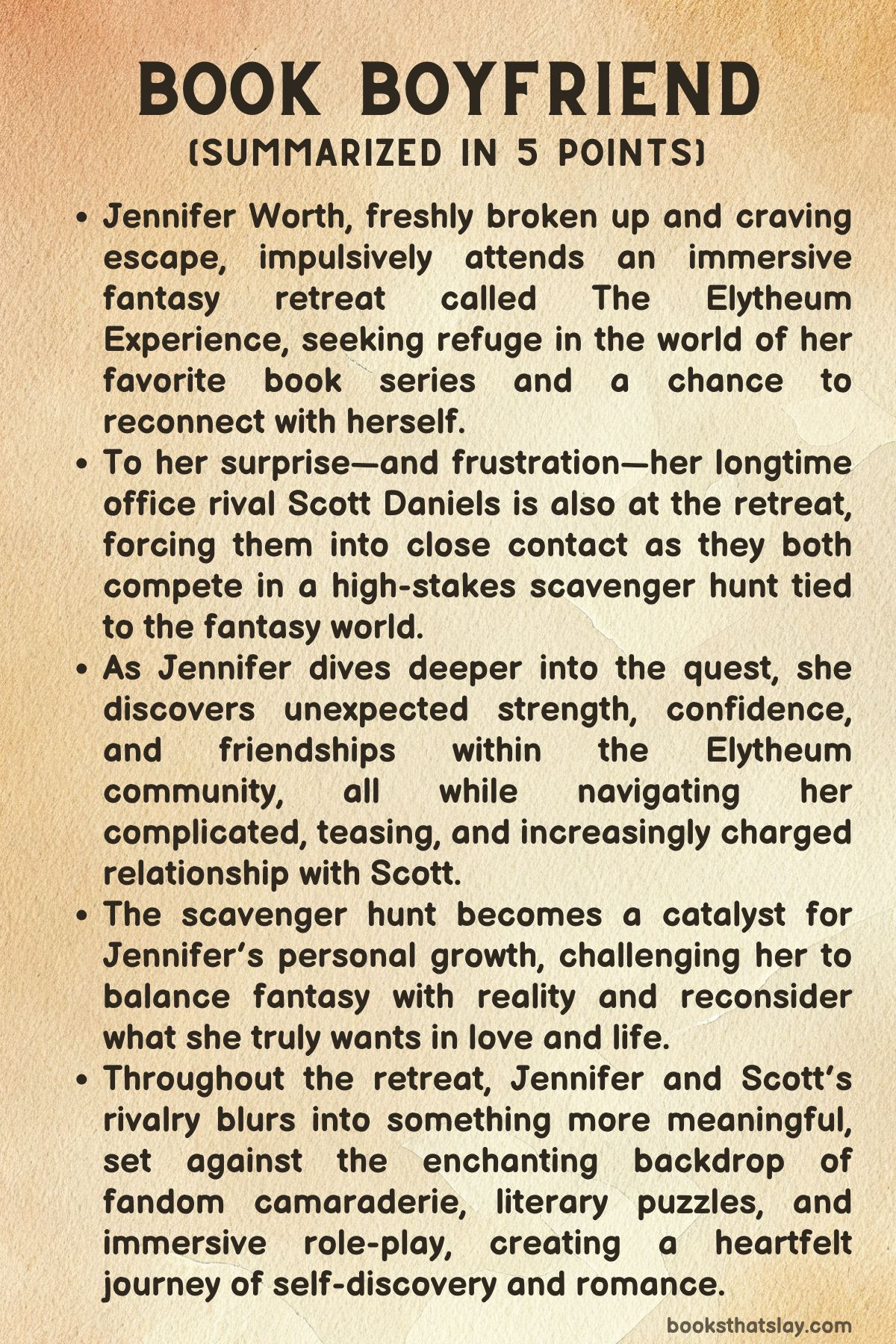Book Boyfriend Summary, Characters and Themes
Book Boyfriend by Emily Wibberley and Austin Siegemund-Broka is a lighthearted yet emotionally complex novel that explores the intersection of romance, self-discovery, and the influence of fantasy on real-life relationships. The protagonist, Jennifer Worth, has long idealized relationships based on the characters in her favorite fantasy novels.
When her real-life boyfriend, Jordan Jenkins, breaks up with her in a cold and public manner, Jennifer is forced to confront her unrealistic expectations and rethink her notions of love. Her journey is complicated by the presence of her coworker, Scott Daniels, with whom she shares a tense, antagonistic relationship.
However, the two are unexpectedly thrown together at the Elytheum Experience, an immersive fantasy event based on the books she loves. As Jennifer navigates the event, her rivalry with Scott transforms into something deeper, pushing her to question both her romantic fantasies and her true desires.
The novel delves into Jennifer’s emotional growth, her interactions with Scott, and the lessons she learns about love, self-worth, and finding beauty in imperfections.
Summary
Jennifer Worth begins the story at a low point, having just gone through a painful breakup with her boyfriend, Jordan Jenkins. The breakup, which occurs in a public setting at her office, is blunt and devoid of the emotional connection she had once hoped for.
Despite recognizing that the relationship was flawed, Jennifer clings to the hope that things might improve, a sentiment that has been ingrained in her throughout her life due to her love of fantasy novels. However, Jordan’s arrival with a box of her belongings marks the final end of their relationship, forcing Jennifer to face the reality of the situation.
As Jennifer grapples with the end of her relationship, she reflects on her tendency to build idealized versions of relationships, much like the ones she finds in the Elytheum Courts series, her favorite fantasy books. In these books, the men are noble and devoted—qualities that Jennifer yearns for in real life.
The realization that such ideals might not align with reality becomes a recurring theme throughout her journey.
Later that day, Jennifer runs into Scott Daniels, a coworker with whom she shares a contentious and antagonistic relationship. Their interactions are often filled with passive-aggressive exchanges, and Jennifer cannot escape the frustration she feels toward him.
However, her world is upended when she discovers that Scott is attending the same Elytheum Experience event she has been looking forward to—an immersive, fan-driven event inspired by the books she loves. The event, which was meant to be her refuge from the heartbreak of her breakup, turns out to be the very place where she must confront her unresolved feelings toward Scott.
The Elytheum Experience is a chance for fans of the Elytheum Courts series to escape their real lives and immerse themselves in the fantasy world of the books. Jennifer had hoped it would provide a temporary escape from her troubles, but seeing Scott there forces her to confront the antagonistic relationship between them.
The event is filled with actors playing characters from the series, and Jennifer is swept up in the magic of the experience. Yet, the presence of Scott, who participates with a detached and analytical approach, makes her realize that her expectations—whether in relationships or in the fantasy world—may not match reality.
As Jennifer continues to engage with the Elytheum Experience, her interactions with Scott evolve. Despite her initial irritation, she begins to see a different side of him.
When Scott helps her solve a clue in a scavenger hunt within the event, Jennifer reluctantly acknowledges his usefulness, and their relationship becomes more complicated. She begins to question the dynamics between them, as their mutual disdain is slowly replaced by moments of unexpected camaraderie.
Jennifer also forms a bond with Laurel and Brit, two other participants in the Elytheum Experience who share her love for the series. Together, they discuss the deeper meaning of the event, and Jennifer starts to realize that it is not just an escape but an opportunity to rediscover herself.
Laurel and Brit help Jennifer see that friendship, not romance, might offer the comfort she’s been seeking.
As Jennifer’s emotional turmoil continues to simmer, she finds herself facing Scott in more intimate, unexpected moments. After a makeover from Laurel and Brit that boosts her confidence, Jennifer begins to take a more active role in the Elytheum Experience, embracing the fantasy world while still dealing with the unresolved feelings she has for Scott.
Their interactions shift from passive-aggressive to playful, and the chemistry between them grows stronger. Jennifer is drawn to him, despite her attempts to resist her feelings, which culminates in a kiss that blurs the lines between rivalry and romance.
As the scavenger hunt progresses, Jennifer’s competitive spirit intensifies. Her feelings for Scott evolve from irritation to something more profound.
Their rivalry turns into a playful, flirtatious exchange, and Jennifer finds herself torn between her desire to win the scavenger hunt and the growing attraction she feels for him. Meanwhile, the event continues to offer Jennifer opportunities for self-discovery, particularly through interactions with Val, one of the actors portraying a key character.
Val’s presence inspires Jennifer to push forward in the hunt, but also to confront the emotional baggage she’s been carrying.
The scavenger hunt leads to a moment of clarity for Jennifer. As she participates in the final leg of the event, she realizes that her idealized fantasies about love and romance may never come to fruition, but that doesn’t mean she can’t create her own story.
She starts to accept that love is not always about fairy-tale endings but about embracing imperfections and finding magic in real life.
The climax of the story comes when Jennifer has a heartfelt conversation with Scott, where they both admit their fears and vulnerabilities. Scott reassures Jennifer that he is willing to support her dreams, no matter what they entail, which leads Jennifer to finally accept that their relationship, while complicated, has the potential to be something real.
The book ends with Jennifer choosing to embrace her future with Scott, not as an idealized fantasy, but as something grounded in the realities of life.
In the end, Jennifer’s emotional growth is reflected in her ability to balance her love for fantasy with the complexities of her real life. She no longer seeks perfection in love but learns to accept and appreciate the messy, unpredictable nature of relationships.
With Scott by her side, Jennifer realizes that she is the heroine of her own story, and that the true magic lies in embracing life’s imperfections.

Characters
Jennifer Worth
Jennifer is a complex and multifaceted character who embarks on a journey of self-discovery and emotional growth. Initially, she is portrayed as someone deeply entrenched in the world of fantasy, often romanticizing relationships and clinging to idealized versions of love, largely influenced by her favorite books.
This tendency to project unrealistic expectations onto her relationships, especially her breakup with Jordan, sets the stage for her internal conflict throughout the story. She is vulnerable, as seen in her reaction to Jordan’s abrupt breakup, but this vulnerability also gives her depth, making her a relatable character for anyone who has faced the disappointment of unrealized dreams.
Throughout the narrative, Jennifer struggles with balancing her love for fantasy with the harsh realities of her personal life. Her time at the Elytheum Experience, which is meant to be an escape, becomes a platform for her to confront the tensions between her idealized notions of romance and the messier, more complicated emotions that arise in real relationships.
Jennifer’s growth is evident as she learns to embrace imperfections, not only in the people around her but also within herself. The relationship that develops between Jennifer and Scott serves as a catalyst for her to let go of her need for a perfect love story, understanding that true connection comes from embracing the real, rather than the imagined.
Scott Daniels
Scott is introduced as Jennifer’s antagonistic coworker, and their interactions are filled with passive-aggressive exchanges, making him an unlikely love interest. However, as the story progresses, it becomes clear that Scott is much more than just a foil to Jennifer’s idealized romantic fantasies.
He is intelligent, perceptive, and emotionally complex, often acting with a level of detachment that masks deeper layers of his character. His actions at the Elytheum Experience, where he unexpectedly becomes involved in the fantasy world that Jennifer holds so dear, force Jennifer to reevaluate her feelings towards him.
Scott’s transformation from a frustrating coworker to a potential romantic partner is subtle yet impactful. His vulnerability, revealed in moments where he opens up to Jennifer about his past, provides a contrast to his often cynical exterior, making him a more relatable and multi-dimensional character.
This evolution is essential in Jennifer’s journey toward self-acceptance, as it challenges her to let go of her idealized expectations and accept the imperfections in those around her. Despite their antagonistic relationship, there is undeniable chemistry between Jennifer and Scott, which gradually shifts their dynamic from rivalry to a deeper connection, ultimately marking Scott as a key figure in Jennifer’s personal growth.
Erik
Erik, Jennifer’s roommate, plays a pivotal yet somewhat understated role in the story. His lighthearted approach to competition and rivalry, particularly with his brother Fred, provides a stark contrast to Jennifer’s more serious and emotionally fraught journey.
While he does not engage deeply in the emotional turmoil that Jennifer faces, Erik’s presence highlights Jennifer’s growth as he serves as a grounding force throughout the narrative. His playful teasing and interactions with Jennifer add a layer of humor to the story, softening the more intense emotional moments and creating a balance between the internal and external dynamics at play.
Erik’s role as a mediator of sorts between Jennifer and Scott is crucial, as his relationships with both characters bring out different aspects of their personalities. While Erik does not directly challenge Jennifer’s perceptions, his light-hearted demeanor and more casual approach to the world contrast sharply with Jennifer’s often anxious and self-reflective nature, helping Jennifer to see things from a more grounded perspective.
His relationship with Jennifer provides a sense of stability, allowing her to explore her feelings without feeling completely overwhelmed by them.
Laurel and Brit
Laurel and Brit, two of Jennifer’s newfound friends at the Elytheum Experience, represent the theme of friendship and support in the narrative. Their shared passion for the Elytheum series and the immersive event allows Jennifer to find solace in their company, reminding her of the importance of genuine connections outside the realm of romantic pursuits.
Their interactions with Jennifer provide moments of camaraderie and emotional support, which contrast with her more complicated relationship with Scott.
Through Laurel and Brit, Jennifer is reminded of the value of friendship, which she often overlooked in her quest for an idealized romance. Their supportive presence allows Jennifer to rediscover her sense of self and confidence, especially as they guide her through moments of self-doubt.
By the end of the story, Jennifer’s bond with Laurel and Brit stands as a testament to the power of friendship and the importance of embracing relationships that bring comfort and encouragement, rather than relying solely on romantic ideals.
Fred
Fred, Erik’s brother, plays a smaller but still significant role in the story. His rivalry with Erik, particularly in the staged performance at the Elytheum Experience, adds an extra layer of complexity to the dynamic between the characters.
While Fred’s presence is more peripheral compared to the other characters, his competition with Erik introduces a theme of sibling rivalry and the pursuit of recognition. This subplot underscores the narrative’s exploration of personal ambition, competition, and the desire for validation—elements that influence the motivations of several characters, including Scott and Erik.
Through Fred’s actions and the rivalry with Erik, the story delves into the complexities of familial relationships and the role they play in shaping one’s sense of self-worth and identity.
Themes
The Act of Idealism
Jennifer’s journey is heavily shaped by her struggle to reconcile her idealized notions of romance and relationships with the realities of her life. Throughout the story, Jennifer projects a perfect, almost fantastical image of relationships, largely influenced by the romance novels she adores.
Her idealization of love stems from these novels, which feature noble, perfect men who treat their partners with unwavering devotion. This fantasy becomes a lens through which she views her own relationships, leading to disappointment when real-life relationships fail to measure up.
Her breakup with Jordan is a pivotal moment that forces her to confront the differences between her fantasies and the harsh realities of her love life. When Jennifer encounters Scott, her workplace rival, at the Elytheum Experience, her emotional turmoil deepens.
Initially, their antagonistic relationship seems to align with the conflict she imagines in her favorite fantasy books, but she gradually realizes that real connections are far more complex. Scott, in particular, represents a challenge to her fantasies, pushing her to see that relationships involve vulnerability, imperfection, and compromise.
The progression of Jennifer’s emotional arc demonstrates the difficulty of bridging the gap between idealism and reality, showing that while idealized dreams of love may offer temporary comfort, true connections are built on authenticity and mutual understanding.
Self-Discovery and Personal Growth
Jennifer’s experience at the Elytheum Experience acts as a transformative journey where she begins to understand her own desires and insecurities. The immersive event, initially sought as an escape from the emotional baggage of her breakup, ultimately becomes a setting for her personal growth.
Her encounters with Scott, despite the initial tension, reveal deeper layers of herself—both in her interactions with him and in her evolving perceptions of what she values in relationships. In parallel, Jennifer’s time spent with Laurel and Brit, who share her passion for the Elytheum series, demonstrates the importance of friendship and personal connection outside of romantic entanglements.
These new bonds help Jennifer realize that her identity isn’t solely tied to her relationship status or romantic fantasies but can also be shaped by authentic friendships. Her time at Elytheum, particularly as she embraces the experience more fully, serves as a metaphor for Jennifer’s own emotional metamorphosis.
The makeover moment, where she gains confidence through a fantasy-themed costume, symbolizes her newfound sense of empowerment and agency, showing that personal growth often requires embracing new challenges and stepping out of one’s comfort zone. Through her journey of self-discovery, Jennifer learns to prioritize her own happiness and emotional well-being, ultimately realizing that she is the heroine of her own life story.
Fear of Vulnerability and Commitment
One of the key emotional struggles Jennifer faces throughout the narrative is her fear of vulnerability and commitment. After the painful end of her relationship with Jordan, Jennifer becomes increasingly hesitant to open herself up to the possibility of a future with Scott.
Her internal conflict centers on the idea that allowing herself to fully commit to someone might lead to disappointment or hurt, much like her past experiences with idealized relationships. This fear of vulnerability is not just tied to romance but also reflects a broader pattern in her life—Jennifer tends to avoid situations where she might expose her true feelings, whether in relationships, friendships, or career choices.
Her reluctance to embrace a future with Scott stems from the same insecurities that have plagued her past, where the idealized version of love she holds in her mind prevents her from seeing the beauty in imperfection and the unknown. However, as Jennifer grows emotionally and learns to confront her fears, particularly in her honest conversation with Scott about her anxieties, she begins to accept that true connection and love require an openness to vulnerability.
The realization that she can have both her dreams and a real, grounded relationship with Scott marks a crucial turning point in her emotional growth, highlighting the importance of letting go of unrealistic expectations and embracing the possibility of imperfect love.
Escaping vs.
The Elytheum Experience, an event deeply rooted in fantasy, represents Jennifer’s desire to escape from the complexities and disappointments of her real life. She initially attends the event as a way to immerse herself in the fantasy world of her favorite books, where the characters and experiences are more predictable and idealized.
Jennifer’s emotional withdrawal from the reality of her breakup and her frustrations with Scott shows her tendency to use fantasy as a shield against her personal challenges. However, as she interacts with Scott and begins to confront the unresolved tension between them, Jennifer realizes that the fantasy world she has clung to cannot offer the answers she seeks.
The event itself, though meant as an escape, forces Jennifer to face her internal conflicts and emotional growth. Through her interactions with the people around her, especially Scott, Jennifer learns that true fulfillment doesn’t come from seeking perfection in a fictional world but by embracing the messiness and unpredictability of real life.
Her realization at the climax of the story—that the true magic lies in finding value in the present, imperfections and all—signals her acceptance of reality, including the complexities of love, relationships, and self-discovery. Ultimately, the theme of escaping versus embracing reality serves as a key turning point in Jennifer’s emotional journey, emphasizing that while fantasy can offer temporary comfort, it is only by confronting real emotions and relationships that one can experience true growth and connection.


